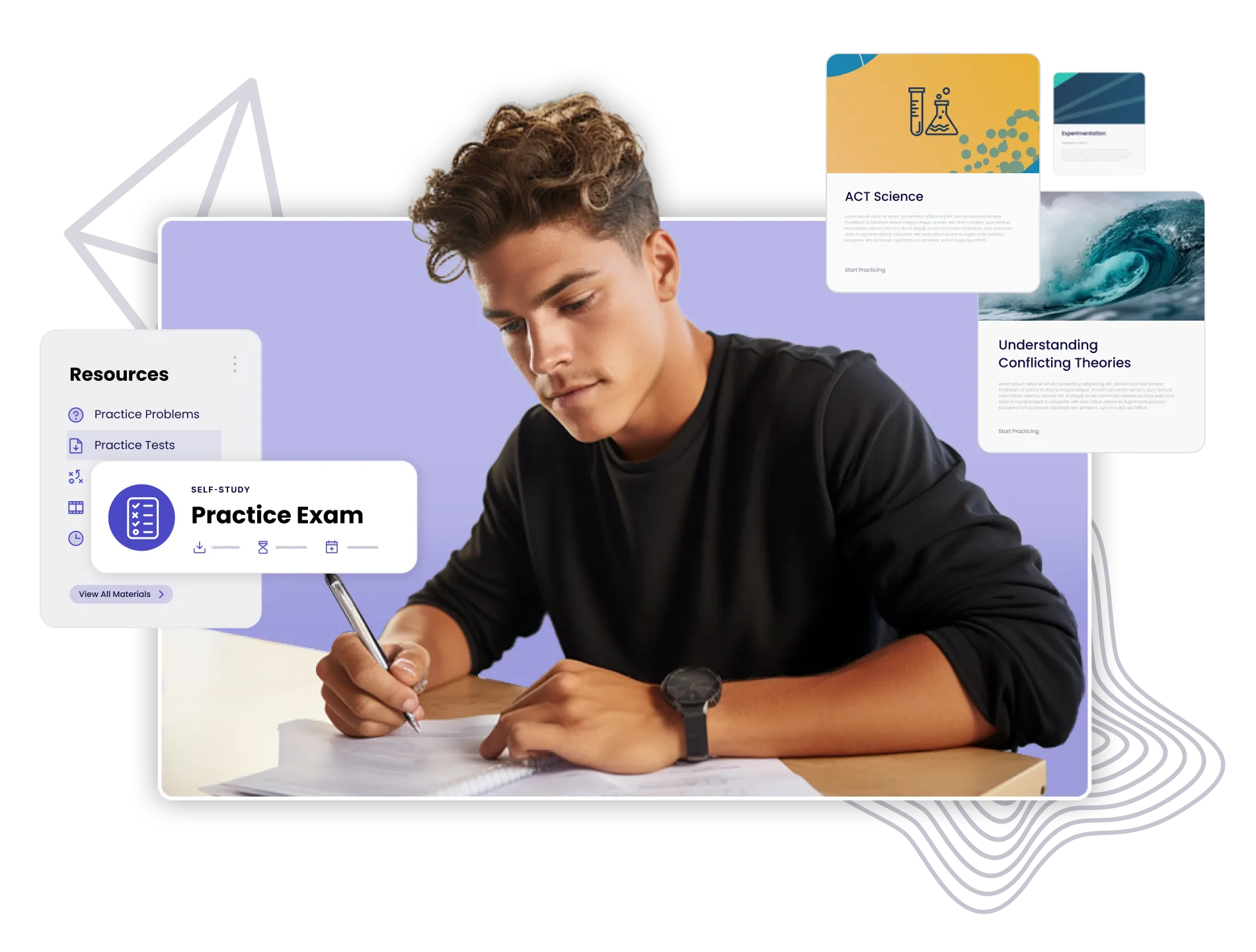5 Habits of Highly Successful Test-Takers

Good test-takers: you know one in every one of your classes, and chances are you’re at least envious of them if not completely annoyed by them. They seem to study less, finish faster, and feel a whole lot less stress than everyone else while confidently and effortlessly posting the highest grades in the class. How is that fair?
But if their superpower is as a test-taker, yours is as a student. So let’s do what you do best: study them, learn from them, and develop a skill set that you’ll carry with you long after “pencils down” on any one given test. Because one thing is true about good test-takers: there’s a method to their madness, and it’s one you can borrow. Here are five habits of highly-successful test-takers.
1. They Shift To A Positive Pre-Test Mindset
If good test-takers seem overly cocky on test day, particularly when compared to conscientious studiers who are a ball of nerves, there’s a reason for that–and it’s a secret of their success. The process of studying, by nature, means you spend a lot of time thinking about material you don’t know well and aren’t confident about. And when you stay up late the night before the exam trying to master those final concepts you don’t know, you focus your pre-test time and energy on the 5-10% of things you do poorly and not the 90-95% of things you do well. Which not only breeds anxiety because your focus is on that slim portion you’re worried about, but also leads to “blanking” or making silly mistakes on the things you really do know but haven’t spent time bringing to the forefront of your mind ready for execution.
The best test-takers start to shift their mind the day before or day of the exam to reminders of the knowledge and thought processes they know they’ll do well on if they’re ready to execute. While an “if I don’t know it by now, I probably won’t learn it tonight” mindset may sound defeatist or overly nonchalant, there’s real virtue in it: by shifting the mind to focus on what they know they can do well instead of what they can’t, these test-takers build confidence and prep themselves for peak performance.
Did you know?
Varsity Tutors Learning Members have access to free, expert-led guided study halls and final exam review sessions,designed to get the most pertinent information top of mind so you can test with confidence.
2. They Start With What They Know (Not What They Don’t)
There’s a similar choice in mindset during the test to the one you have beforehand. While it’s very easy to see a question and focus on the unknown and unfamiliar elements (“I’ve never seen it asked like that before” or “wow that’s a lot of variables”), great test-takers tend to start with an inventory of the things they do know and work from there.
For example, in a recent Varsity Tutors event, Jeopardy! legend Ken Jennings (perhaps the greatest high-stake test-taker of all time) shared one of his key strategies to success on the game: as soon as the categories were revealed, he’d start brainstorming all the topics he knew that fit (e.g. “European Capitals” → his mind was already processing Paris, Berlin, Lisbon, Helsinki… before he ever received a question). That way he had a treasure trove of “known” information and answer candidates top of mind to apply to the unknown information the question could contain. In his words, “even questions that aren’t multiple choice can be multiple choice” if your mind is full of potential options of answers to consider, rules or formulas that might apply, or techniques to test.
Highly successful test-takers always find something they do know and use it to work toward what they don’t: a list of triangle properties to consider to see which may or may not apply, an interesting difference between answer choices that begs comparison. And because those clues give them something proactive to do to work toward the unknown, they don’t leave themselves time to dwell on the very real possibility they won’t know the answer: they have something they can do to get started, which empowers a can-do mindset.
3. Embrace the Journey
Life is a journey, not a destination – a timeless piece of wisdom that holds true in the pursuit of our goals. Setting intermediate goals and celebrating short-term wins is not just a strategy; it's a mindset. It's about embracing the process, finding joy in the small victories, and recognizing that success is a series of steps, not one giant leap.
So, fellow goal-chasers, let's commit to the power of small wins. Break down those big dreams into bite-sized pieces, savor the victories along the way, and remember that the journey is just as important as the destination. Here's to your success, one intermediate goal at a time!
4. They Think Like The Testmaker
Highly successful test-takers recognize that all tests are taken in context: the questions, answer choices (if applicable), and grading rubrics are all made by people. And those people have biases, preferences, and tendencies that can provide clues and opportunities.
For example successful test-takers know that if a professor or teacher as a favorite phrase or analogy they use often in lectures, they’ll appreciate seeing it used appropriately in an essay question: they may not have a crystal-clear answer to the question, but if their professor is fond of saying “things are not always as they appear to be” when discussing art or literature, they’ll find a way to use that quote to 1) show that they’re paying attention to a key theme of the course and 2) give the grader a quick dopamine hit that comes with “I like how they said that.”
Successful test-takers also know that if a term or quote that shows up once in the textbook came up multiple times in class, it’s more important than a term or quote that’s in the book but was never addressed in class. And they know that tendencies on previous tests–the SAT loves to test possessive its and their vs. contraction it’s and they’re; a teacher always includes a vocabulary section full of bolded terms from the chapter–are a great indicator of what to study for “easy points” on the test.
In short, while some successful test-takers may not seem to study the material as much as you’d think they might, they’re likely more than making up for it by studying the person who writes and grades the questions and getting a good feel for what they’ll ask and what they want to hear.
5. They Learn On The Fly
It’s easy to think of tests in the way of “you either know it or you don’t” – if the test starts at 3pm, you take the test with all the knowledge you know at 2:59 and hope you don’t forget things that your final study session precariously stored in your short-term memory. But highly successful test takers have a way of getting smarter as the test goes on. And that generally happens in two ways:
For one, tests tend to cover a limited frame of content, perhaps a unit or a chapter. And tests tend to assess knowledge in a variety of directions: they’ll vary the lines of questioning, provide rich context to analyze in some cases while asking for short answers on limited context in others. Successful test-takers have a way of learning (or perhaps more accurately refreshing or reminding) things they didn’t quite remember when answering one question while they’re reading the context of another. For example, you may not have thought to consider a property of similar triangles in answering problem #5, but when problem #11 asks you directly about similar triangles and includes a very similar diagram, that can signal to you that you may have a new way to solve #5. Or if you blank on the dates that the Articles of Confederation were the law of the land before the Constitution, but are asked about George Washington’s 1789 inaugural address, you now have a pretty good sense of when the Constitution took hold.
Another way successful test-takers learn on the fly is by testing rules and properties that they’ve partially forgotten. It’s a form of getting “proactively unstuck” – they may not remember for certain whether vertical angles are congruent or which way the coefficient of a parabolic equation means the graph is pointing, but they can sketch out a quick drawing with small numbers or plug a basic equation into a calculator to figure out a rule they may vaguely remember or determine which concept really applies. On multiple choice questions they may recognize that answer choices give away a step (“every one of these equations ends up with 2 moles of carbon dioxide, so…”) or that a partial piece of knowledge is all it takes to answer a complex question (“I know I need a large, negative value and the answer choices only include one of those”).
Successful test-takers tend not to accept the idea that “I just don’t know this” and instead have the classic mindset of “it ain’t over ‘til it’s over” – the test form itself contains clues and knowledge that can be converted into an extra few correct answers. And so while it may seem unfair or frustrating that someone can study so much less before the exam and still perform so well during it, a lot of that success comes down to a proactive test-day mindset that you can learn to implement, too.
If you’re willing to significantly study the material before the test, you have what it takes to also study the teacher/testmaker before the test, find information to “study” during the test,” spend some time studying the things you do best immediately before the test, and apply that work ethic and conscientiousness to proactive “getting unstuck” strategies on test day.

